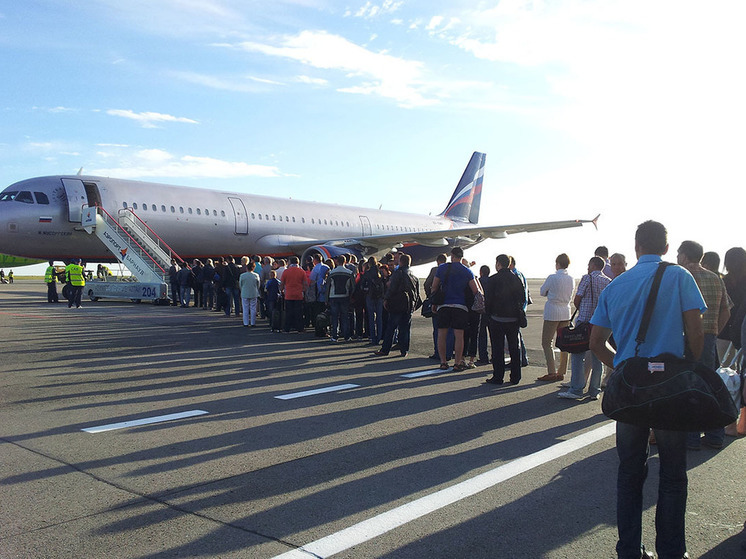New Passenger Force Majeure Fee Discussed
Air travel circles are discussing the possibility of introducing a new fee for air passengers in the event of carrier bankruptcy or emergency flight cancellations. Aviation, like any other market, is fraught with risks. You can make plans for a long time, and then — bam! — pandemic, sanctions or non-flying weather. But the question is: why should ordinary passengers pay for possible, hypothetical force majeure?

The Ministry of Transport denies the authorship of the initiative to introduce an additional fee. Meanwhile, sources even mention its possible amount — up to 300 rubles — from air passengers for insurance purposes. We are talking about creating a «passenger support reserve fund» in case of force majeure.
It should be noted that today in Russia there are no funds to support independent passengers. Yes, there is such an association as Tourist Assistance, but it deals exclusively with charter flights. Meanwhile, talks about creating a «piggy bank», all the funds of which should be used to compensate for damage, in case of problems of the carrier, have been going on for more than 8 years.
Recall that earlier information appeared in the media that in Russia may introduce a new fee when buying air tickets to fill the reserve fund. However, the Ministry of Transport previously and now officially rejected such an idea.
But the expert community is sure that there is no smoke without fire. And here the motives are interesting. Does this mean that some airlines are on the verge of bankruptcy and they want to support them at the expense of passengers?
So, in November 2022, the head of the Federal Air Transport Agency, Alexander Neradko, said that he did not see the risk of bankruptcy of Russian airlines against the backdrop of restrictions in the industry due to Western sanctions. And in general, the aviation market, demand, ticket prices, carriers' revenue — everything is growing! According to the Federal Air Transport Agency, this year the market will reach the pre-sanction level. That is, during the period of international restrictions, airlines will carry the same number of passengers as before the sanctions. But even despite such positive indicators, the idea of a new collection began to be actively discussed again. Why all of a sudden?
We are talking about an amount of about 150 rubles for a flight, and 300 rubles round-trip, Oleg Panteleev, executive director of the AviaPort agency, believes.
“The issue of creating such a fund has been discussed almost since the beginning of the 2000s. Now, if we are talking about the bankruptcy of a medium-sized airline in Russia, then the funds that will be concentrated in the fund for a year or two of work will be enough to fulfill all obligations to passengers. That is, in order to organize transportation flights or transfer customers to flights of other airlines and compensate them for additional expenses,” the expert says.
According to Panteleev, the increase in the cost of a flight by 300 rubles will not radically affect the demand for transportation. “The initiative to create a protective mechanism is quite timely. After all, how was it before? Thunder struck, and we began to think how and how to help airlines and passengers. And here the funds will be accumulated in advance in the fund,” he continues.
This is insurance for the future, emphasizes the editor-in-chief of the Avia.ru portal, analyst Roman Gusarov.
“Let me remind you that in 2015, when Transaero ceased operations, people had 1,800,000 tickets left in their hands. Then the state allocated funds from the budget, the passengers were taken out, — says the interlocutor of MK. — But then the volume of traffic was lower, the country was not under sanctions, and there was no budget deficit. It must be understood that financial assistance from the state consists of tax collections. That is, in any case, everything is paid for by the consumer, only the methods are different: either through taxes and the budget, or through the fund.
Meanwhile, if one of the largest airlines in Russia encounters serious difficulties, then the problem will be no longer in the return of funds to passengers, but in ensuring that the entire industry has enough resources (seat on planes) to remove passengers who have tickets from a problem company. The same Transaero, who died in Bose, had a market share of only about 10%. Passengers were found where to transplant. But if a larger player leaves the market, great difficulties will arise and no funds from the fund will help here.
“The problem is the transparency of the fund itself,” Gusarov emphasizes. — Passengers should know who is the holder of this fund, how the money is distributed and to whom. I don't want the funds to just dissolve. And cases when the fund collects money, and then spends the entire amount not for the intended purpose, but for itself, are not such a rarity.”

